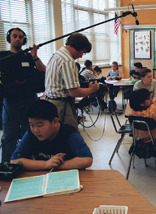| Science Media Group | In Production | |||
|
Public Outreach  Annenberg Channel (2008)
Annenberg Channel (2008)
From 1996 through 2008 the Science Media Group operated the Annenberg Channel, a free satellite channel broadcasting award-winning educational programming.
 The Habitable Planet (2007)
The Habitable Planet (2007)
A multimedia course for high school science teachers and adult learners looks at the systems that make Earth a planet that sustains life. The course was designed to help educators deepen and extend their understanding of environmental science.
 "Impact! The Making of a Meteorite" (2007)
"Impact! The Making of a Meteorite" (2007)
Interactive video loop shows how meteorites are created through Asteroid Belt collisions and propelled to Earth. Users get to create their own collision by changing parameters. Accompanied by a stand-alone video and a more comprehensive interactive game for classroom use. Originally produced for a permanent exhibition at the Harvard Museum of Natural History, will be distributed on DVD.
 "Climate Change" (2006)
"Climate Change" (2006)
Harvard professor Dan Schrag leads viewers to vote on what they would do to mitigate climate change on an interactive Web based game for visitors to the Harvard Museum of Natural History. Two video loops (Milankovitch Cycles and Dissappearing Ice) are included in this permanent exhibition.
 "Lighthouse of the Skies" (2006)
"Lighthouse of the Skies" (2006)
Promotional DVD for major Harvard-Smithsonian Center for Astrophysics astronomical activities.
 "Arthropods" (2006)
"Arthropods" (2006)
Three video loops showing the diversity of Arthropods installed in a permanent exhibition at the Harvard Museum of Natural History.
 Coalition of Essential Schools (2005)
Coalition of Essential Schools (2005)
CES EssentialVisions DVD series captures how the CES common principles have been implemented, illustrating how students engage in their own education and how teachers develop as professionals.
 Beyond the Solar System DVD (2005)
Beyond the Solar System DVD (2005)
The Beyond the Solar System Professional Development Project offers opportunities for deepening content knowledge and exploring strategies for teaching and learning about current scientific models and evidence for the origin and evolution of our universe of galaxies.
 "Origins" (2006)
"Origins" (2006)
Video loop with paleontologist Andrew Knoll on early life for traveling exhibition produced by the Harvard Museum of Natural History.
 POVme (2005)
POVme (2005)
A program showing that science is something top athletes — people tweens admire and respect — care about, know about, and use. POVme provides tweens with new role models for science — something those who are underserved and at-risk sorely lack — and give them a new mental image about what doing science can be all about.
 Harvard-Smithsonian Digital Video Library (2003)
Harvard-Smithsonian Digital Video Library (2003)
This collection of video clips provides more than 350 hours of digital video material, archived in digital form and indexed through a searchable database; the collection is linked to local, state, and national STEM standards.
 SportSmarts (2000)
SportSmarts (2000)
An educational campaign designed to increase people's understanding of science as well as the role of science in sports. This initiative sought to improve the understanding of science through efforts in schools and via public outreach. SportSmarts built on research in science education and teacher education
conducted at the Harvard-Smithsonian Center for Astrophysics.
 Cosmic Questions (2000)
Cosmic Questions (2000)
Interviews segments, exhibit walk through, and other video pieces for the museum exhibit titled: Cosmic Questions: Our place in Space and Time.
 Technical Difficulties (1997)
Technical Difficulties (1997)
It is a pilot half-hour show for a proposed 39-part, three-year broadcast television series. The full series proposed to use current research in how children learn science to help viewers (ages 9-12) learn fundamental concepts in science.
 Minds of Our Own (1996)
Minds of Our Own (1996)
These three one-hour programs are designed to make science teachers aware of students' preconceptions. An extension of the award-winning video, A Private Universe, Minds of Our Own shows that many of the things we assume about how children learn are simply not true, and that the education system we have built is based largely on a series of myths.
 Project STAR (1994)
Project STAR (1994)
These two videos accompany the Project STAR textbook: Light Games is a homework video to investigate inverse square law with experiments using lights and distances and Sun, Moon, Stars is an interactive time-lapse classroom resource exploring the day and night time sky. Students use simple tools to take astronomical measurements from the time-lapse images on the TV screen.
 A Light Dose of Murder (1991)
A Light Dose of Murder (1991)
This funny court room trial explains the properties of light. A Light Dose of Murder was the pilot for a children's TV series.
 Einstein USA 15 cents (1986)
Einstein USA 15 cents (1986)
Montage of Einstein's life and discoveries to celebrate the design of the Einstein 15 cent US stamp.
|
Chemistry for the 21st Century An on-line introductory course that humanizes and demystifies chemistry through 13 half-hour video programs, on-line text, and interactive labs. | |||




